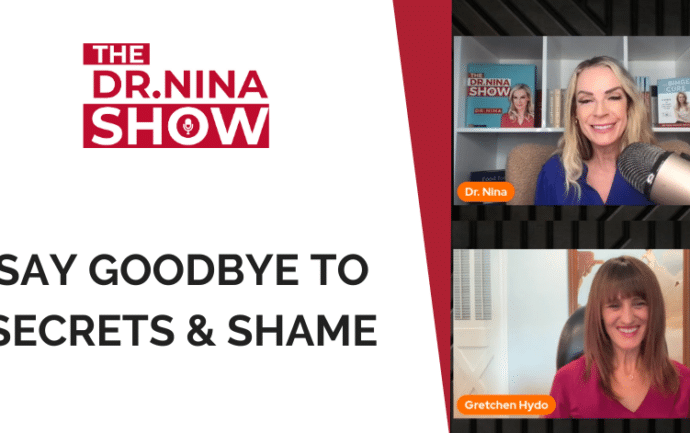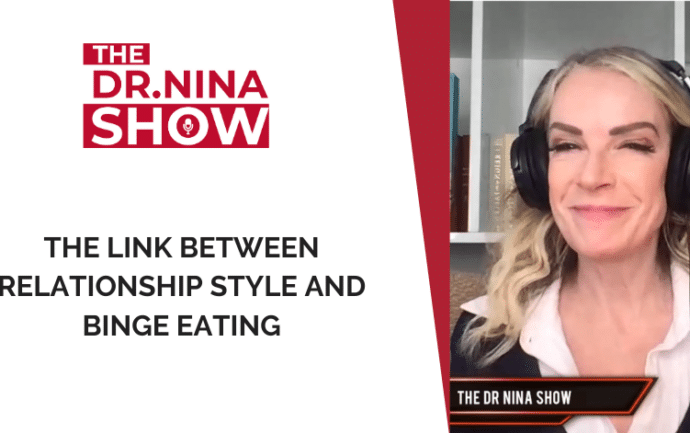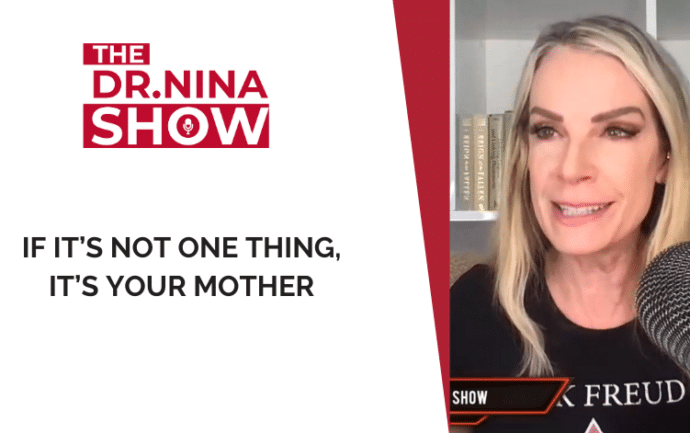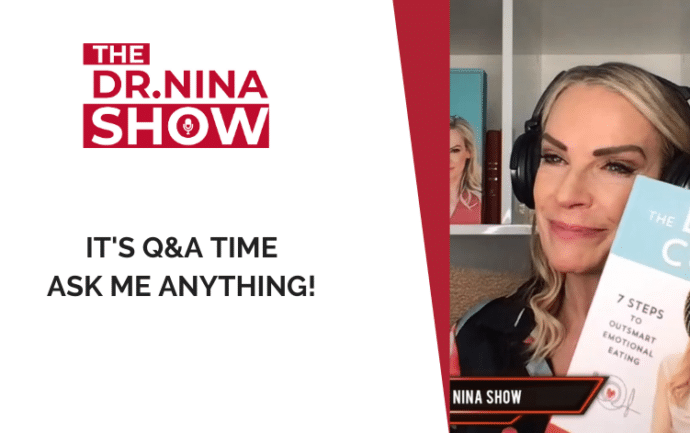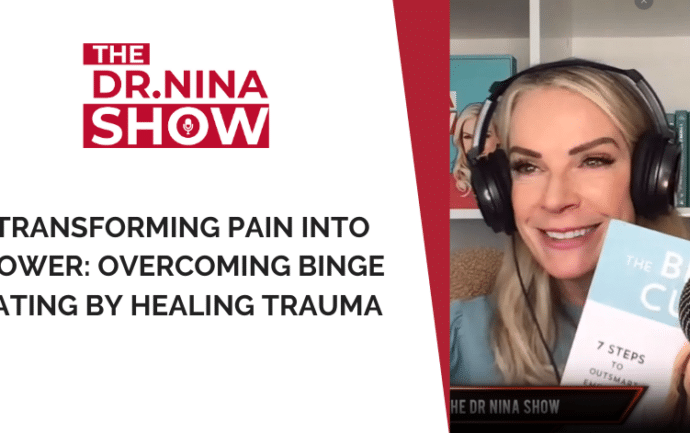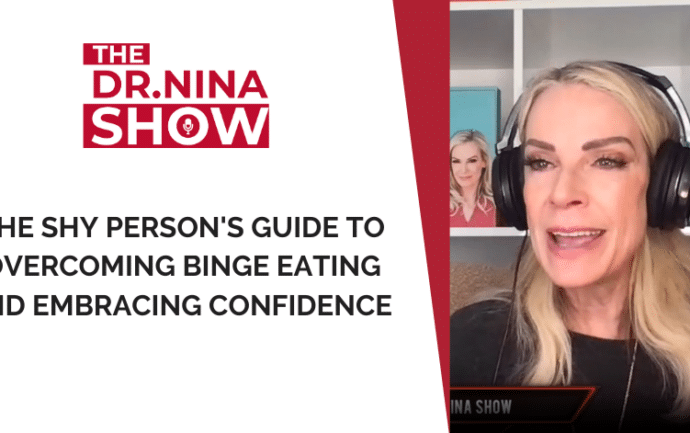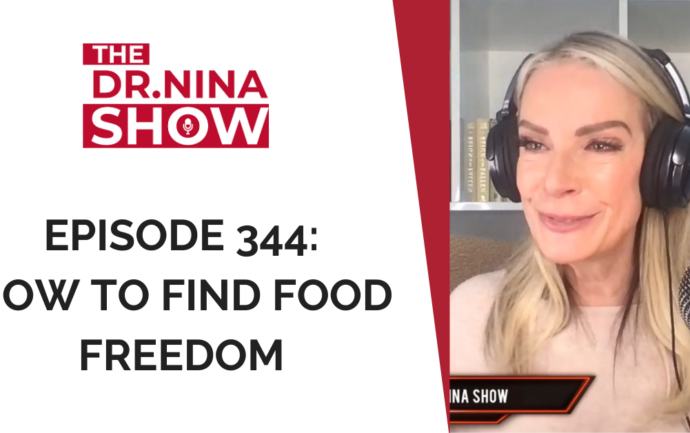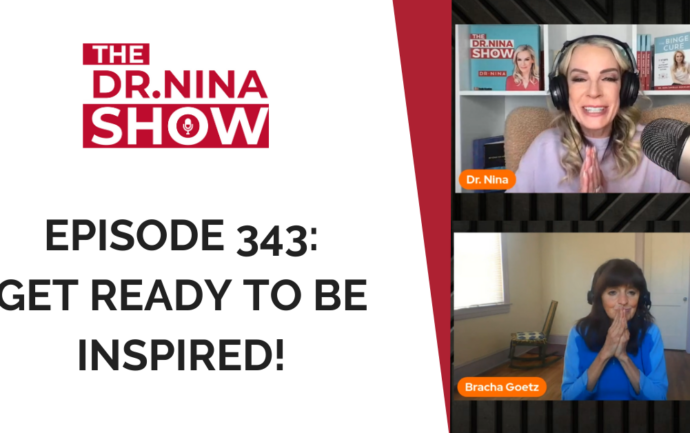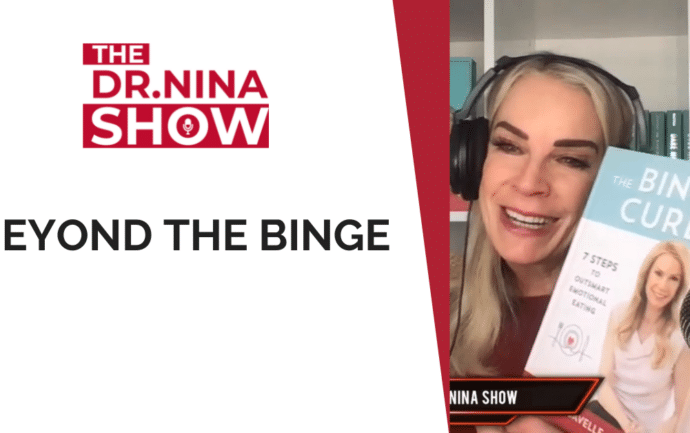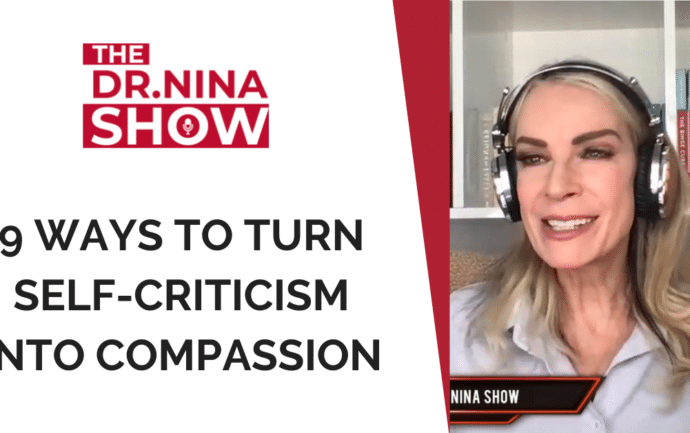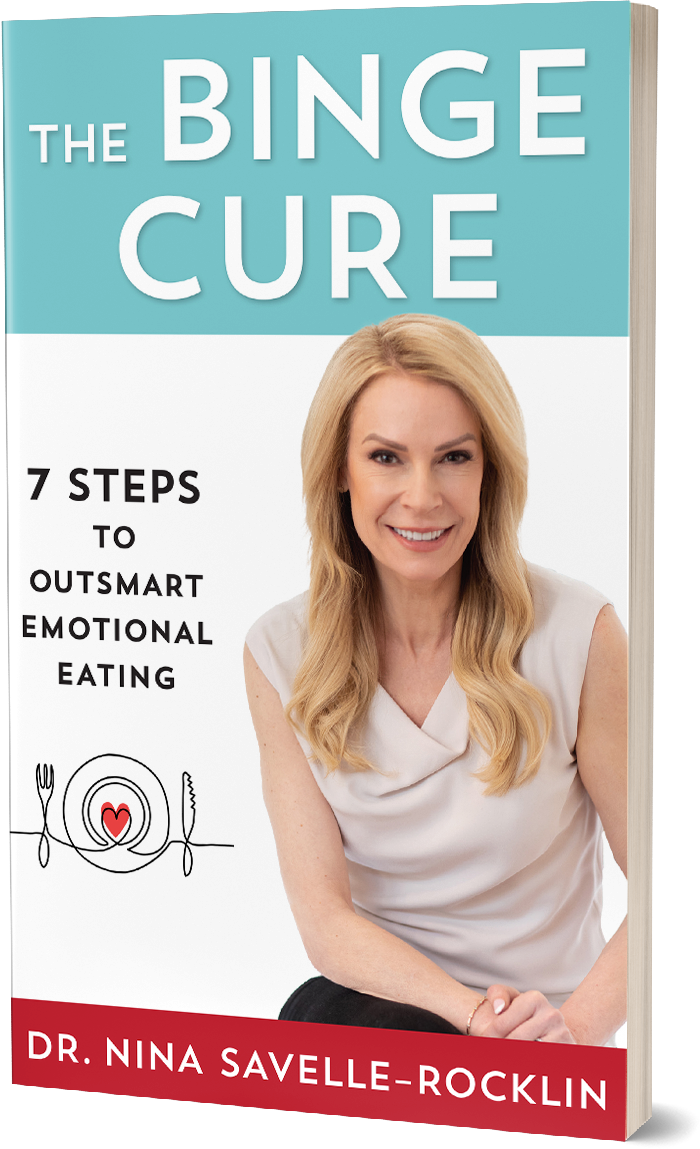Dr. Nina Savelle-Rocklin
How to Stop Emotional Eating [Podcast]
Table of Contents
- Summary
- Transcript
- How do you stop emotional eating?
- Diets always fail
- How to crack the code of emotional eating
- The link between emotions and binge eating
- Emotions are reactions to situations
- Try the grounding exercise
- Example: Emotional eating
- Aloneness
- Enmeshment
Summary
In this episode, I will give tips and strategies on how to stop emotional eating. We also explored perfectionism and talked with Karlygash about goals, the ladder of life, and psychoanalysis.
Transcript
You're listening to the Dr. Nina Show with Dr. Nina Savelle Rocklin only on LA Talk Radio.
Dr. Nina: Hey there? Welcome to The Dr. Nina Show here on LA Talk Radio, I am your host, Dr. Nina Savelle-Rocklin. And I am here to help you stop counting calories, carbs, and fat grams, so you can easily get to a healthy weight and get on with your life.
That is my mission. I want to help you wake up and think about your day, not your diet.
If you would like to talk with me today, the number here is (323) 203-0815. I would love to hear what is on your mind, and what is weighing on you because the real problem with binge eating, stress eating and any kind of emotional eating, the real problem is not food, the real problem is what is eating at you.
So let us get to those root issues, those underlying reasons that are causing you to turn to food rather than focus on what you’re eating. That’s how you get rid of this issue forever. I’ve had so many people who say, “Oh! I’ve got to struggle with this for the rest of my life. I’ve got to deal with this always.”
No, no, no, no, no, you don’t, because when you get adept at identifying and processing what is going on within you when you recognize what is going on inside and you find a new way of responding to yourself. Guess what? All of those food issues go away forever! That is true liberation.
That is what we’re aiming for in my POST-DIET REVOLUTION.
Okay, so let’s get started.
How do you stop emotional eating?
Last week, I started talking about my article in Psyche magazine called, How to Stop Emotional Eating. And I talked about my patient Arlene, I’m calling her Arlene, but that’s not really her name. And she had a thing for donuts and would just binge on donuts and thought that she had a doughnut problem.
However, as we were to discover, she did not have a doughnut problem. I will tell you more about that as I go through this article. And one of my recommendations is, of course, to stop dieting. If you have listened to the show for any amount of time, you know that I have a very anti-diet approach.
Diets always fail
The first three letters of that four-letter word diet spelled die, so there’s a hint right there. But essentially, diets always fail. And they fail for physiological reasons, biological reasons, and psychological reasons, which are the ones that I’m here to talk about.
And diets involve deprivation and the anticipation of deprivation or the experience of deprivation will always make you want something more.
If you think you can’t have it, you’re going to want it. Plus if you’re spending all day thinking about, not eating bread, ice cream, or whatever it is that you think you can’t have, something with a carb, then you’ve got food on your mind all day. And that puts the focus on, what you’re eating instead of why.
I think I’m going to go over some of what I talked about last time, because if you heard my last show, you may need to hear it again. Often people need to hear things many, many, many times to make a change. In this work, at least repetition is a good thing.
How to crack the code of emotional eating
One of my recommendations is to crack the code of emotional eating, which is working out the link between, what’s going on within, what are your emotions and what is eating at you, and what are you eating.
And a lot of people overeat or binge to avoid emotion.
“And a lot of people overeat or binge to avoid emotion.“
Dr. Nina
Dr. Nina: So Arlene, she ate so much that her stomach hurt. And that was our first clue to solving the mystery of what was going on with Arlene and why she could not stop eating donuts.
Now, Arlene was raised in a family in which everyone was expected to be grateful and happy all the time.
If she was hurt or upset, she was told to stop whining. She was told that she should be grateful that there were children in India who didn’t have a roof over their heads, she should be lucky for everything she had and therefore shouldn’t be upset about anything.
If she was upset about a bad grade, well, she should have studied harder. If she was upset about some… Whatever it was, she was told why she shouldn’t feel that way.
So, the message was clear, it was unacceptable for Arlene to express emotional pain. And by eating doughnuts until she was in physical pain, Arlene was unconsciously avoiding her emotional pain. She converted it into a physical feeling.
And when she was able to express this disavowed emotional pain during therapy, instead of blocking it out, she stopped overeating donuts.
Wasn’t quite that simple and I will get to it more in a little bit, so bear with me.
So our society promotes the idea that expressing feelings is a weakness.
Girls and women were taught that “It is not nice to be angry, it is not nice to feel or express anger.” Don’t do that, it’s not nice. See, even if I had to lower my voice to a whisper, it’s not nice to have those feelings.
Well, it’s neither nice nor not nice, feelings are simply a reaction to a situation.
And what happens is, a lot of people then get angry. A lot of women who won’t let themselves be angry at anyone else will get angry at themselves for eating something or for weighing whatever.
They were already angry and their anger belongs to something or someone else. But if you’re told you’re not supposed to express it, you’re going to have a hard time doing it.
And similarly, boys are taught from an early age that, “Boys don’t cry.” And they grow into men who have a hard time expressing vulnerability. Guys are not supposed to be sad.
In fact, I once talked to someone, I was actually being interviewed by a podcast host. And he said to me, “So you’re saying that there’s a link between emotions and binge eating?”
The link between emotions and binge eating
Dr. Nina: I said, “Yes, there is a link between emotions and binge eating.” And he said, “Well, I’m a dude, I don’t have feelings.” Well, yeah, dude, you do have feelings. And he struggled with food, which is why he had this podcast and that was the whole point.
He thought it was just unacceptable and he was not being facetious, he was serious, “I’m a dude, I don’t have feelings. You’re not supposed to have feelings if you’re a guy.”
The big problem in our society.
Because, of these societal expectations, many people grow up feeling they can’t admit to, as if feelings are something that you have to admit to. They can’t admit to or process those feelings.
So emotional eating can be a way of dissociating from those feelings, from the world, temporarily escaping from whatever is bothering you.
And my patients often describe the experience of zoning out while they’re bingeing or zoning out while they’re eating. They don’t have any thoughts in their head, they don’t feel anything, and they’re just in this place of blankness.
Emotions are reactions to situations
Remember that emotions are just reactions to situations, they are not character flaws. And when you find a new way of coping with your feelings, you won’t need to rely on food. When you cultivate new ways of responding to yourself, guess what? You don’t use food to do so.
If you find yourself zoning out when you’re eating, if you’re using food to escape, to comfort, to numb, to just check out of the world, especially now when we are going through a hard time in our world.
Everyone in this globe is going through this pandemic and it causes a lot of anxiety. If you are going through that, you’ve got to remember that you are in a process of change, you are in a difficult time. It is not always going to be this way but you have to be gentle with yourself right now.
Try the grounding exercise
And also, there’s something called a grounding exercise that I’m going to teach you. It sounds so goofy, and every time I explain it, people look at me like, “What? What are you talking about?”
And that is… But it works. It works because it takes your mind and your brain, two separate things, and it works together to ground you in the present. And when you’re grounded in the present, it’s easier to cope.
And what that is you look around your environment and you note one thing you can touch, see, hear, and smell.
So, you say to yourself, well, I’m touching my computer. I see myself in my Instagram feed, as I’m doing my show live on Instagram as well as being live on LA Talk Radio later turned into a podcast on Apple Podcasts, for those of you who might not know that.
And then, what do you hear? “Well, I hear nothing, I hear absolute silence, I hear myself.” And what do I smell? Well, a little bit of the remainder of the incense that I had burning earlier in this room.
Why do you do that? Because by saying that and ideally, you'd say, “Okay, I'm touching my computer, I see myself in my Instagram feed, I hear my voice, I smell a little bit of that incense.”
When you do that and you do that maybe a few times, you’re no longer in that place of super anxiety, sort of centers you. That is the idea, to center yourself in the present moment.
Then you want to also consider if there are any specific feelings you are trying to avoid. If you automatically eat when you’re upset, you’ve got to be curious, not critical, and discover why you’re headed for the kitchen. And there are many reasons for emotional eating.
Example: Emotional eating
Dr. Nina: For example, you might feel lonely or dissatisfied. And that is an internal sense of emptiness, which is then symbolically filled with food. When we are lonely, we talk about feeling empty. When we’re disconnected, we feel empty also. And when you feel that in your body, you can physically symbolically fill the emptiness with food.
Of course, it doesn’t work for long because it’s just a symbolic fulfillment, not an actual one. And so, if that is something that you do a lot, consider some questions, consider what you need more of in your life. In what areas do you feel deprived? And those answers can help you identify what is missing. What is the missing piece that is creating the emptiness?
Whether you’re in an unfulfilled relationship or you lack satisfaction in other parts of your life or you’re alone, or you want more friends, or you want a relationship, or you’re, I think worst of all, in a relationship and feel lonely in the context of that relationship, you can take steps to change. And that will help you stop figuratively getting fulfillment from food.
Other people turn to food to manage helplessness, which is a sense of feeling powerless and one of the most painful experiences of human existence. Lance Dodes, who’s an addiction specialist and a psychoanalyst says, “All addictive behavior is a way of reversing helplessness.” That is what he says.
“All addictive behavior is a way of reversing helplessness.”
Lance Dodes
And my thought, and I agree with him. And my thought is that it is easier to feel helpless over food than it is to feel helpless over, for example, a virus, a pandemic, social unrest, or uncertainty. When are you going back to school? When are the kids going back to school? What’s going to happen? Are you going to get a job? Are you going to get your job back? What’s going to happen?
There’s a lot of uncertainty and helplessness over that. It could be easier to focus on, Oh! I can’t believe I ate those cookies, then it is to feel helpless over the world. And so if you are often feeling focused on what you’re eating, ask yourself, “In what areas of your life do you feel powerless?” Maybe you’re displacing that powerlessness in life onto food.
Because once you can identify it, recognize it, process it, and that doesn’t mean fix it, that means deal with it. We all have to come to terms with certain limitations, especially now with COVID. Come to terms does not mean, “Hey, you’re cool with it.” It means, “I’m going to do the best that I can do given these circumstances. And I’m going to figure out a way to get through it. And I’m going to feel powerful over that, not powerless over the entirety of it.”
And also, it is very common to turn to food when you’re bored. Now, boredom is the state of feeling like you have nothing to do, along with restlessness and a tediousness about the day. Now, I call boredom an umbrella emotion because it covers other emotional states, like loneliness.
Often people say, they are bored, but they’re lonely, or they’re really upset, or they’re something else. They just call it the state of boredom. So, the solution to boredom is to try and change something. If boredom is covering up another difficult emotion such as loneliness, then address that underlying need.
If you’re lonely, try giving someone a call, and think about ways you might meet new people. Even in COVID times, there are ways to meet new people. And sometimes, of course, we can’t make boredom go away. And if there’s nothing to do or nobody to be with, soothingly responding to yourself is critical. And that’s turning loneliness into solitude.
Aloneness
Josh is on Instagram. He says, “There must be a link between what’s lacking in my life and my messy relationships with food.” Yes, so that’s an interesting word to use, “Messy relationship with food.” So, Josh, please feel free to share more. What is lacking in your life? What is emptiness? What is it that you’re missing? Feel free to post and I will share it with the audience.
Loneliness is having a sense of total aloneness. Solitude is being alone with a loving part of yourself. Solitude is when you can be supportive of yourself when you can be kind to yourself, and when you show up for and with yourself, then you are not lonely. Loneliness is pretty unbearable, it’s so painful. But when you can be with yourself, be with a kind, soothing, supportive, encouraging part of yourself, you will not be lonely, you will experience solitude, which is the sense of being alone with yourself in a way that feels good, tolerable, good, reassuring.
Also consider if you’re eating for comfort, because our initial experience of feeding as babies is tied to feelings of love and connection. And think about what happens when a baby is fed. They feel safe and loved in the arms of a parent, it’s a warm, cozy, ideally, lovely environment.
I’m going to pause because Karlygash is calling. Thank you, Ronan.
Dr. Nina: Hi Karlygash.
Karlygash: Good morning.
Dr. Nina: Good morning.
Karlygash: Good morning Dr. Nina. Nice to hear your voice.
Dr. Nina: Likewise.
Karlygash: Thank you. I will just jump right into whatever is, I’ll just call without any specific topic but then I thought about the people surrounding us. And I always remember how you say, “Relationship to food symbolizes a relationship with people.” That people are unpredictable but the food is predictable and always there for me, and it’s my friend.
Yesterday, I talked to one girl from Kazakhstan. She used to be my coach, in love, you know love, area, relationship, but she just really need therapy herself but I can see now, I couldn’t see back then. And I noticed that I have in my life a lot of people who are, majority of them are alcoholics but I don’t know that. They never tell me that they drink or use substances because I don’t drink, don’t smoke. I don’t know why they just hide it.
But then, later on, I just noticed this alcoholic behavior. They always lie and make things look better than they are in reality. Back then as a kid, I never learned to set boundaries. I simply didn’t know what is true in life and what is not, because I never had an adult who could give me this information and guidance.
So, I just used to believe people but after working with you and doing therapy, I just realized that people just seem to lie, and it’s my job to figure that out. I haven’t talked to her for more than two years because my therapist said, “Oh! You need to stop this whatever coaching because she’s not a professional, she doesn’t have a license.” She said, “You need to focus on therapy with professionals.” So, that’s what I did.
And talking to her after two and something years, I just noticed how much I grew. I remembered myself back then two years ago when I was all scared, had no boundaries, had horrible relationships with people and food like myself, and abused myself daily with food, and lack of sleep, by all these awful people around me, and she’s still the same.
Enmeshment
She’s still the same, nothing changed, same words, but I did, I changed. Whatever she said, I used to believe because she acts just like my family members. Just like them all were lying to me and my mother too. Always lying to me, trying to make their way at my cost. But this time I could see it, I just asked the question I needed.
I needed some information from her and then I stopped the conversation and I thought, “You know what? I don’t need this person in my life.” And that was a very good decision. I’m very grateful for all therapists out there. You guys help us fix our life because I had such enmeshment, how do you say it, enmeshment?
Dr. Nina: Enmeshment.
Karlygash: Yeah, enmeshment with her. And if not for that therapist back then two years ago, I would be in really big trouble. So back to food, it’s getting much better. I’m doing this program, I’m learning how to feed my body and stuff. I still sometimes, overeat here and there on sugar and then I remember that like you say, “I like the sweetness of life.”
And I just heard that you were talking about solitude. I love my solitude, I have people around me, and I can connect to them but now I want to connect to really good people who are kind and not abusive and just kind. And connect with you for the mere purpose of just connecting with you and sharing good times.
So that’s my thoughts for today. And I want to have good relationships with food because I noticed also when I abandon myself by bingeing, I feel so terrible physically. Oh! I wanted you to talk about this abuse, how these people abused me, and how I abused myself by [inaudible 00:24:21] because with my disease and like I think any person in the world needs to eat properly to feel good.
Bodies are not trashcans, they can sustain as much abuse as much, but at a certain point they break. Anybody will break even the strongest one if you keep abusing it. I was like, I just started feeling my body does exist and it also has needs. And I’m like, “Wait a minute, I have needs too.” And it’s very interesting, I’m at this point where I’m just exploring myself and just starting to live life properly as a normal person.
And then I’m like-
Dr. Nina: Can I interject something because I think you brought up an important point which is, before you continue talking about this, I just want to say, the point you brought up was you looked back and realized how you had felt the difference between how you were two years ago and where you are now. And this is such an important thing to do, which is to create a balance between where you were, where you want to be, and where you are.
And this is the metaphorical ladder of life I like to ask you to think about, which is that it’s very common, especially in our society now where we say, where do we want to be? I want to get there, I want to lose X pounds, and I want to get a better job. Whatever it is that you want in the future, it’s easy to look up and say, why am I not there? Look at where I’m not, and then we feel bad, and then we feel bad about ourselves, and then you know where that leads?
That could lead to bingeing, stress eating, and emotional eating to cope. But what you just talked about was that, you looked back two years and essentially you said, “Look where I was and look at how far I’ve come in that two years?” And this is so important because, on the ladder of life, we do want to look backward and say, “Look where I was. And look how far up I have come. Good for me, I’m proud of myself, I have accomplished that, I have changed.”
And you want to balance that with, “Yeah, I do want to be up there farther along the ladder. And I also have to be where I am now.” So, balancing the past, looking down, seeing how far you’ve come from the past, looking up, seeing where you want to go in the future, and being on the rung of life where you are today is vital.
When you’re always looking up, you just feel bad about where you are because you’re measuring the distance between where you are now and where you’re not. So, I appreciate that you shared how much has changed in two years because that’s important for you to hear. And as a reminder to everyone listening, balance, remember where you’ve been, how far you’ve come to be where you are, and yeah, you’re going to get somewhere else.
Karlygash: Thank you so much, your words are so valuable Dr. Nina. And honestly, I just want to tell all listeners that you taught me that it took my work, it took me time, but I learned it. And I’m still getting there, to fully being aware and living my life with 100% awareness, but I’m like, it’s much, much better. And also I wanted to mention that, I [inaudible 00:28:10] this fact that, majority of people live 47% of their life either in the past or in the future, not in now, almost half.
And I’m like, “Whoa.” And I think in my case when you have PTSD, like trauma and stuff, I think it’s even more, I think it’s 95 or something. But this work is so important because once I’m out, once I’m in reality, Hey, I do my stuff, I do my things, I do my [inaudible 00:28:38], I used to have emotions and fears, but when I’m not stuck in those upper racks of the ladder or lower racks of the ladder but really being on the rack right now or the ladder and just looking around what’s going on. Then I have the space and energy to walk up one more.
And I’m just very grateful for that before I would never be. I was never able to say to myself, hey, I’ve done so much work, unless the results were not materialistic. Oh! I’ve got another degree, or I made so much money, or I bought a car, or I had this and this partner. So, I measured myself by this, it was just the wrong measurement system for me.
But I heard it so much from the people around me and I’m like, maybe I need to change people, it’s just unhealthy. If people are not doing therapy, they’re not even thinking about it. I just understood, I think that’s what I’m trying to say. I just understood the people, like you say, my angel says, if people show you the first time who they are, believe them.
I think I learned this lesson yesterday because, if people are not in active therapy or change, which is hard work, they will pretty much be the same. And it’s my job to walk away from people who hurt me or are uncomfortable and go and find those who I like and enjoy and more like mutually… How do you say it? Reciprocate my communication.
By saying all these smart words, it’s for me so valuable. I worked so hard just to come to this understanding, being there in my head, I’ve worked hard.
Dr. Nina: I’m glad to hear that you are acknowledging yourself and focusing on that instead of looking at what you’re not. It is so important for you to realize what you like about yourself and what you appreciate about yourself and acknowledge the hard work that you’ve put in, and that makes you feel better, right?
When you’re always talking about what you’re not doing, not you specifically Karlygash. But when people are always talking about what they’re not doing, they feel bad. And when they feel bad and they don’t have a way to feel good because you can’t simultaneously make yourself feel bad and prop yourself up, then they’re going to go to food or something else to cope.
But when you can be kind to yourself and recognize and approve of yourself, you feel good and you don’t need to get away from your mean voice.
Karlygash: That’s true. And I also want to quickly say, for people out there who are thinking about, whether or not to do this work? I would suggest, for all my people struggling with binge eating and eating disorders. I would say, “Please dive into this work. Please just dedicate yourself, make it, your church, your religion, because psychoanalysis and psychotherapy work.”
And it's like a working tool, it’s not like woo-woo, whatever. It’s a very specific thing because I’m listening about the psyche. It seems like woo-woo, but it’s very structured, it’s almost like math. If you do the formula, you will get the result, so I would suggest that.
And I also wanted to say that, it seems very overwhelming in the beginning when you do that, when they say, “Oh! My God, what are my [inaudible 00:32:36] needs?” Those relationships, just feel overwhelming and messy, but it’s like eating grapes or like cleaning a room, cleaning your house.
You don’t have to clean the messy house all at once, you’ll just be overwhelmed. Just one day, clean your closet and you know, one step at a time. In the psychoanalysis work, you do remove one trashcan at a time or you take the grape, one grape at a time. And at one point it will always be less and less of this mess and an effective coping mechanism and one day it’s going to be better.
I just want to pass this message to all people out there who may be feeling down today or you know how it is with binge eating. We feel bad and then we binge and then we feel worse. It feels sometimes as if you’re walking in the dark, but hang on… How do you say? Hang on there?
Dr. Nina: Hang in there.
Karlygash: Hang in there, keep doing, it’s going to be better. I can promise, because when I started, I was thinking, “Yoh! My case is impossible to solve, I’m from another country and living in this country. I’m from Kazakhstan, and my first language is Russian, which is like, a total mix of everything. Where will I find a person who will sort it out?”
Well, Dr. Nina, I think I was very easy for you to deal with because it felt overwhelming. But then when I started doing… Honestly, in the beginning I couldn’t understand what I was doing like three years, but I had only one thing I did. I always had this motto, I always used to tell myself, “Bring your body, just bring your body. I need to bring myself to therapy, to session or now we’re in pandemic, just pick up the phone, call your therapist.”
Just be there, don’t think, don’t overthink, don’t predict the future, just be there. These people are professional, they will do all the work for you. It's like, when you go to surgeons, you don’t ask the surgeon, “Oh! Can you make it like surgery? Are you sure?” You just lay on the table and she does the work on you, removes whatever needs to be removed.
And it’s the same type of work, it’s invisible though. Nobody is cutting your organs or giving you knew organs, you cannot see it but it’s there, it’s very tangible and results are tangible too.
Dr. Nina: Thank you, Karlygash. I very much appreciate how much you have benefited and how enthusiastic you are about psychoanalysis and psychoanalytic thinking because it is, in these contemporary days of insurance only wanting brief therapy it’s not widely known. Hopefully, it’s staging a comeback and I’m trying to single-handedly, not single-handedly but be out there, be the contemporary face of 21st-century psychoanalysis.
Thank you Karlygash, and I’m so happy to hear that you are feeling better today and that you’re not tolerating the kind of people that you have been tolerating for much of your life. When you are around people who treat you poorly, that just becomes your standard. And it feels familiar and we tolerate the familiar and then we become mean to ourselves.
And when we’re mean to ourselves and someone is mean to us, that’s also familiar. And it’s like, “Hey, come be with me.” But when we are kind to ourselves, generous to ourselves, supportive to ourselves and someone is mean to us, “No way, get out of here, I don’t have no use for you.”
This is very powerful what you’re saying, and I appreciate your call so much.
Karlygash: Thank you so much, Dr. Nina, I appreciate all your work and help. I think you’re just a saint, you’re like a modern saint, you need to put in church and [inaudible 00:36:38], and I [crosstalk 00:36:40] listen to you, you know?
Dr. Nina: I don’t know. I don’t think that as someone Jewish, I qualify for sainthood but, hey, I appreciate the compliment. Mostly, I appreciate that you are feeling good today and keep up the good work of being kind to yourself and I look forward to hearing from you.
Karlygash: Just very quickly. I’d like to add, I don’t feel I didn’t wake up feeling good today. Honestly, every morning I wake up, I have very highly depressive stuff jumping right on me the moment I open my eyes, or even before. And maybe once a year, I have a day when I woke up happy. But I have my tools and the work I’m doing right now helps me to get out of the feeling, that condition, and build this good feeling, because when I wake up and I feel bad, what do I do? I binge to feel better.
So, it’s a vicious cycle and I need to break it and I’m breaking it every day and hopefully every hour. You will be kidding, I’ve set a timer that rang every 10 minutes the whole day, which reminds me of the tool like a smile or I’m starting my day easily and just reminds me. And each time it rings, I just come back to awareness, like retraining myself.
So, thank you so much.
Dr. Nina: Thank you, Karlygash.
Karlygash: And have a wonderful day.
Dr. Nina: You too. All right, bye, bye.
Josh is a fan of psychoanalysis and he is reading Slouching Towards Bethlehem, which I thought was a Joan Didion book, but maybe more than one person can pursue and have a title, written by Nina Coltart who’s another psychoanalyst. I guess Josh you’re into Nina’s psychoanalysts.
You might like my book, Food for Thought: Perspectives on Eating Disorders, which was my first book which is more of a scholarly academic book.
Maya is saying, “How would you eliminate the pressure that comes with trying to be a perfectionist for the next goal?” I think I would challenge some of that language and look, instead of making perfectionist the next goal to say, “Why do I think I need to be perfect?”
So, what would being… First of all, what is perfection? It does not exist.
So, Maya, you feel pressure because you’re trying to be perfect. Why are you trying to be perfect? What is it that perfectionism will do for you? What is it that you think being perfect will give you that you don’t have? That would be something that I would be interested in.
If you feel comfortable writing on the thread here on Instagram, please do so.
There is no perfect and often we think, “Well, it’s a when-then trap.” When I’m this, then my life will be that. When I’m at my ideal weight, then I will be more confident, I will have more friends, I’ll get a boyfriend, I’ll get a girlfriend, I’ll leave my partner, I’ll have the guts to do this and not do that, whatever it is, it’s the when then trap.
That when you’re at a different weight or, it doesn’t have to be weight but for this show, I’ll use weight. When I’m at this weight then my life will change, which is the illusion that by changing your weight, you can change your life.
When you change your weight, you do not change your life. When you change your weight all that happens is, the number on the scale changes, the number of your genes changes, and that’s it. You internally do not change.
People say, “Well when I lose weight I will be happy, when I’m perfect I’ll be happy.” No, when you’re happy you’ll lose weight.
So many people have had the experience of having gastric bypass surgery, some kind of bariatric surgery, lap band, lap sleeve, what have you, and they have lost weight. And then what happens? They feel good for a while. I’m not saying you’re not going to be happy. Yeah, you’re going to be happy, you’re going to be elated for a while.
But unless you change the root core reasons for why you were turning to food, you are going to turn to something else or you’re going to go back to food.
For example, my friend Kelley Gunter with whom I do The Binge Free Babes, lost 243 pounds and promptly started gambling and drinking and all of this, because she never learned how to relate to herself and she never resolved the core trauma of her life, which was different things to avoid the state of being with herself.
So, Maya, I would ask, what is it that you think you will get when you’re perfect? What is the when and what is the… The when is perfect, the then is what? And what makes you think you have to be whatever that then is? So, something to think about.
Maya, if you want to write in, I don’t know if you’re still there but if you want to write in and share your thoughts, I will share them with the audience. If not, a lot of you can probably relate to Maya, the sense of, well, I’ve got to be different to be acceptable, I’ve got to be perfect to be acceptable, I can’t miss a beat, got all of that. Let’s challenge that.
Babies, when they are fed as infants, we’re held, we’re in loving arms, hopefully, we have a loving gaze upon us, and we have this blissful experience of bonding that goes with being fed. And that is why in our psyche, food resonates as a relationship. We talk about food as love, no food is a relationship. And when people are not to be trusted, food is very trustworthy.
As Karlygash said, quoting me, “Food is reliable, available and predictable people could be unreliable, unavailable and unpredictable, better to have a connection with food than a connection with people.” What I say in the article is that, deep in our psyches, as strange as it seems, food represents people.
“Food is reliable, available and predictable people could be unreliable, unavailable and unpredictable, better to have a connection with food than a connection with people.”
Dr. Nina
Dr. Nina:
We don’t think of it that way actively, but we use the same words for food and love. We describe relationships as fulfilling or satisfying, the same with food. We talk about being hungry for love and starving for attention, food and relationship are intertwined in our minds. And people again can be unpredictable, unreliable, and unavailable.
Whereas for many of us, food is the opposite, a reliable, readily available source of comfort. And that is why it’s easier and safer feeling to turn to food instead of to people when we’re upset. Eating for comfort means, expressing a wish to be cared for by someone else, expressing a wish to be comforted by someone else. And we have to learn new ways to self-soothe.
Everyone who eats emotionally is trying to soothe themselves in some way. So the key to change is to find a new way to comfort yourself, comfort yourself with words instead of food. And I have some strategies to deal with that, which I talk about often on the show, I talk about in this article. The number one strategy is to change the way you talk to yourself.
Remember how Arlene told herself, Arlene, if you didn’t listen to the last show, Arlene was talking about her inability to stop binging on donuts. And she said to herself, “Oh! You have no willpower; you are so gross.” To herself. And nearly everyone I have ever treated has spoken to themselves in this vicious second-person voice.
If you use the pronoun, you, when speaking to yourself, consider who is really. It might be the voice of someone who criticized you in the past, it might be your internal voice, a voice you develop to try to keep yourself in line, or it might be a voice that you heard used by someone else. Someone else was criticized and you have absorbed it into yourself.
But being self-critical never helps, it just makes things worse. So when I asked Arlene to say, “I have no willpower, I am gross.” She couldn’t do it, could not do it. She said, “Oh! It feels mean.” And she also realized that she was talking to herself in the same dismissive way that her mother had done.
She had absorbed her mom’s critical stance towards her, towards her feelings, and was now speaking dismissively towards herself just as her mother had spoken dismissively towards her. So when you start criticizing yourself, imagine saying those words to someone else. If it’s difficult, if you wouldn’t say those words to a friend, a child, or a loved one, do not say them to yourself.
Imagine you have a friend who’s upset because she ate too much pizza. Would you say, “Well, that is disgusting, how could you have eaten all that?” Which is what you might say to yourself. Of course not, you would never say that. You would respond in a more loving and supportive way.
And next week, I’m going to get into other ways that you can support yourself in those moments other than being cruel to yourself, which of course never, ever, ever, ever works. Because when you’re mean to yourself and you call yourself names, guess what? You’re going to want to get away from your mean voice.
And what’s the easiest way to do that? Head to the kitchen, go into the zone, that eating zone. Someone once called it, “The dead zone.” They said, “It’s the dead zone. I don’t feel anything. It’s like I’m dead inside, I don’t feel anything. I’m not thinking anything, it’s an escape.” It’s an escape that helps at the moment but ultimately it hurts you because it doesn’t resolve anything.
And I want you to learn a different way of being with yourself, for yourself, so that when you’re upset, when life throws you curveballs, instead of beating yourself up, instead of being mean to yourself, instead of telling yourself how you should, could, would and why didn’t you? Oh! You know that voice.
Instead of doing that, you can be a voice of lovely reason, you can be supportive and loving to yourself. When you do that, life is so much better and food stops being a problem. I promise it is possible.
So that is our show for today. Thank you so much for joining me on The Dr. Nita Show here on LA Talk Radio. I am here live every Wednesday at 11:00 AM Pacific.
As I said before, the show is then made into a podcast. So you can listen to the podcast later on Apple Podcasts or anywhere you get podcasts. Just look for The Dr. Nina Show on LA Talk Radio.
And again, please be kind to yourself, be curious, not critical. When you’re curious, you’re more likely to find answers. When you’re critical, you just make yourself feel bad.
Stay curious, stay safe, and stay healthy and I’ll see you next week. Bye, now.
The Author
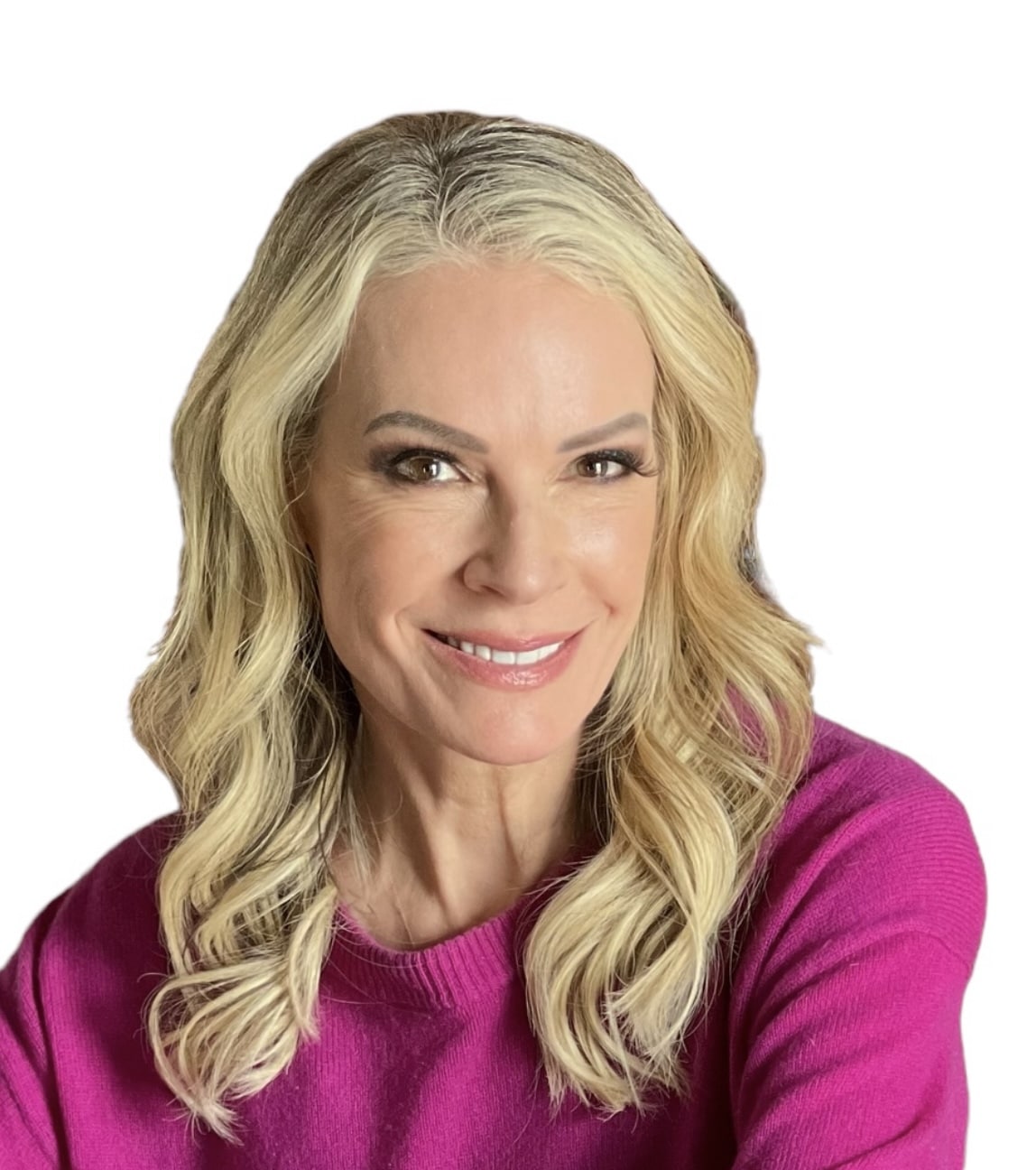
Dr. Nina Savelle-Rocklin is a psychoanalyst, author and radio host specializing in binge eating disorder. She is the author of The Binge Cure: 7 Steps to Outsmart Emotional Eating and Food for Thought: Perspectives on Eating Disorders, and co-editor of Beyond the Primal Addiction. She hosts The Dr. Nina Show radio program on LA Talk Radio.
More episodes

